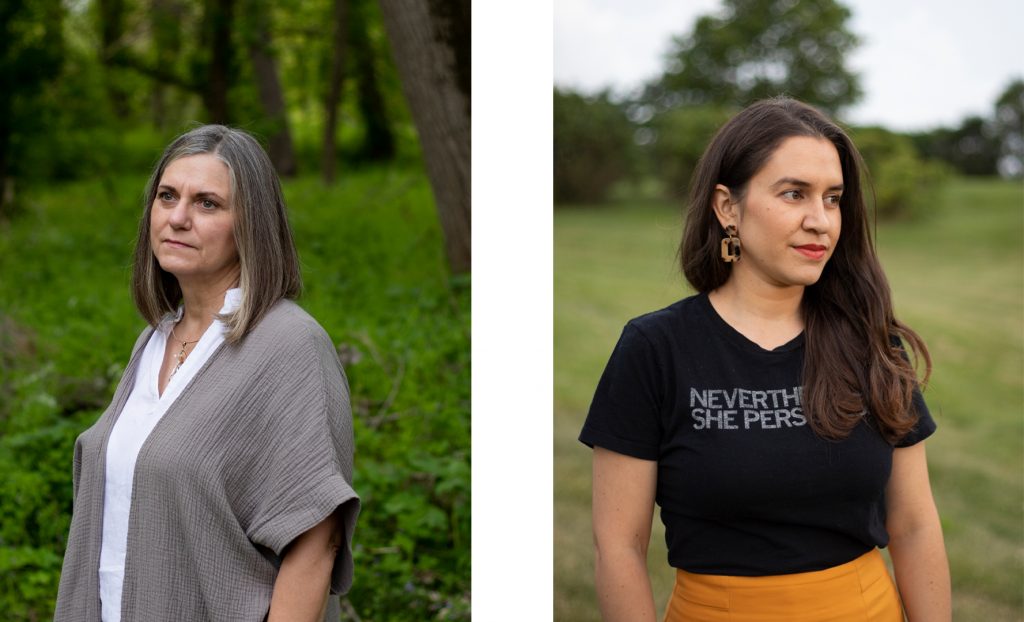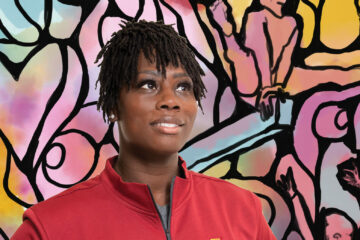A conversation with a former and a current nonprofit executive director on making space for women of color in leadership
By Emily Blobaum, Fearless editor

On Sept. 2, 2020, Laurie Schipper addressed a two-page letter to Iowa Coalition Against Domestic Violence board members. “It has been a challenging and reactive time with so many opportunities to make transformative changes,” it began.
Three months earlier, in the midst of the racial reckonings brought forth by the killings of George Floyd, Breonna Taylor and other Black people, Schipper and leaders of 44 other sexual assault and domestic violence coalitions from 33 states signed the Moment of Truth letter, which acknowledged the ways that their leadership failed underrepresented survivors, leaders and movements, specifically people of color. In it, they detailed changes they would support surrounding partnerships with police departments and the criminal justice system. The work that led to the letter was not easy, nor was it an easy road after, as the stance was seen as controversial by some in the state and nationally.
She received feedback from several leaders of ICADV’s culturally specific programs. “Those are great words, but where’s the action?” they asked. Schipper came to the decision that it was time for her to step aside and make space for a person of color to hold leadership.
“We tell ourselves that because we’re in Iowa, a white-majority state, that it’s too hard for us, that the numbers [of qualified people of color] are not there. It is hard, because you don’t get the numbers unless you do the internal work,” Schipper said.
She wrote in her resignation letter: “This is a truth I have been thinking about for a number of years, recognizing that I am one of those white women who took on a leadership role at age thirty and stayed forever, never making room to center the leadership of women of color. … It became clear to me during our staff discussions that it was, indeed, time for me to move on.”
She was 58 and had been the executive director for nearly 30 years. ICADV board members and staffers were surprised, but supportive, she said. Schipper called on the board to hire a new executive director as soon as possible, and indicated that she would stay on through the spring to help train her replacement. At the same time, Schipper and other ICADV staff members created a five-year action and accountability plan.
“What we found is that the work that we’ve done publicly around supporting communities of color and leaders of color brought an amazing group of women to the position as candidates,” Schipper said. “There were a lot of women of color that could have filled this position. That’s something that white-led organizations should know, even if it’s Iowa.”
In January 2021, ICADV hired Maria Corona, who is a three-time graduate from Iowa State University with degrees in women’s studies and international studies, a master’s degree in family and consumer sciences, and a Ph.D. in human development and family studies. Before her hiring at ICADV, Corona worked closely with Latina and Latino survivors of domestic violence at Iowa State’s Child Welfare Research Training Project and worked as a diversity outreach coordinator and advocate for survivors of domestic violence at Assault Care Center Extending Shelter & Support (ACCESS).
Schipper has transitioned out of her role as senior consultant to the executive director and now works for Galvanize USA, a national women’s empowerment and voter engagement organization.
The following conversation with Schipper and Corona has been lightly edited and condensed for clarity.
Laurie, when did you come to the decision that you would step down and make space for a woman of color?
Schipper: It’s important to acknowledge that I’ve thought about it for years, and as a white woman, I’ve had the privilege of setting it aside and asking if it was convenient for me at this moment. It started in 2015, although it wasn’t a specific plan. It was working with folks at the national level thinking about what it would look like to center the leadership of women of color and the needs of marginalized communities. That work was really transformative and led us to the Moment of Truth letter.
After the letter was released, our culturally specific programs were holding us accountable. At the time it was really painful; now I know it was a gift.
I was talking to some of my friends who run national programs, and they said, “Do it. Just do it.” I still didn’t think it was financially possible in my life. But hearing them say to do it stuck with me. I was in a place of great privilege and I had waited way too long. And if not me, who could we ask to do this? It was hard and scary and sometimes I felt sorry for myself. I was defensive, threatened and sad that people didn’t beg me to stay. But leadership is taking the leap.
Because I had been here so long and because the Moment of Truth letter caused a lot of commotion politically with law enforcement and legislators, it was important for me to stay in a role of leadership so Maria could get her feet planted and I could help open doors or deflect anything that was my fault so she didn’t have to. It’s a complicated role and I wanted to make it easier. I had to do a lot of white fragility work in a short period of time. That transition has been the growth experience that I didn’t anticipate and that will always be every time I see Maria’s face, something that I am so humbled by and so appreciative of and love her so much for.
Corona: It’s important to know that the national folks that Laurie tapped into for support through this process are also women of color. If you don’t surround yourself with diverse thoughts and people who come from underrepresented communities, you’re not really going to hear and feel what it means to give up your space as a white woman. So that support that Laurie had was essential to this transition. She could have easily just talked about it with her white friends and they might have said, “Are you crazy? Why would you leave that role?”
It may feel like a very micro-level thing that happened, but it’s actually huge. I’m a state-level leader, but I’m on a national stage because of our position as a coalition and what we do policy-wise at the national level.
Throughout this transition, I never felt that Laurie framed this experience as, “I’m doing this for you.” It’s not a hand-me-down. It’s her own reckoning. I appreciate Laurie for staying as long as she did, because this is a really hard job.
I have knowledge, skills and experience. I’ve been organizing in the community and I’m well-versed in research, grant-writing and other administrative pieces. There are other areas that I need support in, and her staying really gave me the space to take a breath, to think about the transition and really assimilate into the role and feel what it’s like to be in this powerful space.
My undocumented mother would never think of this as a reality, and she’s so proud. To have the opportunity to do this and show my skills and compete, and I know there were a lot of other great candidates, it was all about showing that this is my purpose. I went to grad school for this. It’s a marathon that I’m still running. There will be rocks along the way and things thrown at me and other barriers that I have to face as part of my identity. [Schipper’s] staying so long gave me a sense of support and it made me feel like “I’ve got this. I can do this.” It also allowed me to learn from her.
Schipper: I took Maria’s job at the age of 30, with one job experience under my belt and a bachelor’s degree. Maria would have likely not been able to get hired at that point in time. Maria has articulated to me that in order to feel heard by the world, she had to get a Ph.D. So this wasn’t about going to look for somebody who may or may not be qualified. Maria was very qualified and would not have been considered likely because of structural racism.
This isn’t about being a white savior. It’s about white folks taking on a super hard reckoning and learning things about themselves that they don’t want to know, and then stepping aside. I want white folks to know that my world didn’t come to an end. It was hard, but wow, what I get to watch happen now. This is where Maria was supposed to be.
“If you don’t surround yourself with diverse thoughts and people who come from underrepresented communities, you’re not really going to hear and feel what it means to give up your space as a white woman.”
You mentioned the notion that women of color often have to be extra qualified to even be considered for jobs. What are other barriers or challenges that women of color face in being hired for leadership positions?
Corona: Women of color always have to prove that we’re good enough, that we are in this space because we have the skills, the capacity and that we’ve done the work. As a Latina, I come from a very collectivistic space. We are very community-driven, and what we do in our life, it’s all driven out of love for my community. Yes, it’s out of love for my family, but also for other families who look like mine, or that experience systemic racism. That’s how I drive my leadership, based on lived realities and experiences of people. That’s something that I think women of color also have to constantly prove is valuable.
Because there’s a lack of representation, there’s a limited number of folks I can look to for support. There’s very few Latino/Latinx nonprofit directors. I can’t really reach out to people who are like me and vent.
Another barrier is the space within your organization. Do people believe in you? What perceptions do they have of you? Do they believe you’re capable enough? If you don’t have a team that respects who you are and recognizes your value as a human and a professional, you’re not going to feel welcome. You’re not going to feel supported. You’re going to be constantly battling within your own organization. I have never been in a space with majority-white people that actually believe in me. And it sucks. You’re always wondering, “Should I say something? Should I say that a comment was racist? Should I have a conversation?” I’m thankful to say that as of now, I haven’t had to do that. ICADV’s team is amazing and they are all ready to do the anti-racism work. Before I came here, they put together an action and accountability plan for working toward being antiracist and uplifting and centering the BIPOC [Black, Indigenous, people of color] community. Having that space ready, I didn’t have to come in as a new leader and walk on eggshells because someone is doubting me and my skills. I am so lucky to say that, even more so because I’m in Iowa.
For me, after graduating from Iowa State University, I wanted out. I was like, “I need to get out of Iowa. I need to go somewhere where I know my community is and I know I can feel the love and respect that I need and deserve.” I never expected that at ICADV. I’m still building relationships – it’s my fourth month on the job – but I feel very comfortable. With the video of the 13-year-old Latino kid that was killed by police in March, I was able to come in and say, “This is really heavy on me right now.” And they’re there for me telling me to take care of myself. You can really be your full self at ICADV. I’m so proud to be here. I’m so proud of my team. It’s all a matter of us holding ourselves to the action and accountability plan.
Another barrier is relationships with community leaders and leadership across member programs. What do they think about me? Never in my life would I have thought that I would be able to get on a call with the attorney general. When that happened for the first time, when I hung up the phone, I cried. I come from a community and a family that said, if you see a cop, go the other way. You don’t talk to them. You don’t call them. I’m calling the biggest cop in town now. I’m getting on a phone call with him to ask him to do something for me. That is incredible. I would have never thought that that’s something that I would be doing in my life. It gives me a sense of so much responsibility, not just for survivors of violence, but for communities of color. To know that I’m in this position is amazing. It fills me with lots of strength and it makes me feel empowered. It also makes me feel a little afraid because of the amount of responsibility that I have for my people, for my community and for communities that are underrepresented.
Laurie is one of the women that has paved the way for people like me, for women like me. She gave space for my community, for the undocumented community, for folks that are typically not given the room to speak up. That means a lot. And it was really thoughtful. Everything was really intentional, thoughtful, and set up for me to succeed.
Schipper: Not all white-led organizations will necessarily be ready for this. There have been a lot of casualties before Maria [at ICADV] in wanting to diversify for the political correctness of it and hiring women of color when we weren’t ready to look at our own white supremacy culture. For those women, it was never a fair playing field when they came into our organization and they all left. We have lots of reckoning to do around that. I wanted to make sure that we took on several years of really intensive work around our own white fragility, anti-racism work before our team was ready for this.
So as much as I would want to encourage people to look at their ability to center the leadership of women of color, I also think you have to do the work to get there. I am haunted by the women before Maria that didn’t find the space welcoming, that didn’t find it a place where they could fulfill their potential and left.
Corona: Thank you for saying that. That’s why I’m lucky to be here now. If I were to have come on 10 years ago, I probably would have not been in the same space that I’m in now. I could see the internal work that the staff does on their own; it’s really beautiful to see that growth. It’s scary for white people to do that. You get lots of feelings like shame and guilt. You’re uncomfortable. But it’s courageous to stay in those feelings and work on them and process them. To say, “I’m going to work on myself and I’m going to work on my behaviors and habits that have caused harm and that continue the ideology of what’s supposed to be professional,” that’s courageous. The team is doing that work all the time. And when they don’t, they call each other in. I’ve witnessed that and it’s amazing.
“Women of color always have to prove that we’re good enough, that we are in this space because we have the skills, the capacity and that we’ve done the work.”
You mentioned the notion of “doing the work.” What does that look like?
Schipper: We had a book club that met regularly over a two- or three-year period. It was mandatory for all white folks at the coalition. We took recommendations from folks of color on staff who thought we should read specific pieces. We had hard conversations where we challenged each other. Then we asked ourselves about how many groups we could join where we could support leadership of color. We delivered cookies to organizations that we didn’t know anything about except that their work was something that we wanted to support. We did listening tours all around the state, and met with natural leaders in communities of color, like ministers and day care operators. We went to all kinds of places where people could tell us what we could do to be supportive as a white-led organization and how we could open doors for their agenda.
I had thought this was a great plan on my part. I wrote up an introductory letter, saying that we’ll bring the cookies and that we just want to hear about what you need, and that we have some political power and that we can open doors for you. Immediately it was clear that the organizations didn’t buy that for a second. It took so much energy and relationship-building to get organizations to believe that we really meant it, and that we weren’t there to mine information or resources from them. It took probably three years of us having cleared our legislative agenda completely, saying, “We will only support what the community wants” and that we will not support the criminal justice system as the primary intervention for community safety. It took a lot of time to [prove] that we meant it.
Corona: That’s important, because you’re going into a community and you’re listening. You’re not going in there with an agenda, which is a typical thing for white-led organizations to do. It is hard for us as people of color to tell people – especially white people – what we need from them. We are accustomed to always giving up something for them because they always need something from us.
Another thing we’ve done internally is modify personal practices to support staff of color specifically. For example, if there’s an internal promotion happening, it’s a priority to consider BIPOC staff. It’s one thing to say something, and it’s another to actually write it into your personnel policies. Another example is through ICADV’s victim counseling training. We now center intersectionality and the systemic issues that survivors – especially survivors of color – have to navigate. It’s our lens of how we look at the training. Other things include investing in racial and social justice action and activism.
What Laurie did was intentional and thoughtful. It was very well-planned. All of that internal work she did as a leader and as a team, that is not something our community knows. So it’s very easy for them to perceive that what she did is performative when actually things have been worked on for a very long time. It’s something that you have to actively do every day. Nationally, other coalition directors in the field are doing the same thing now. That is beautiful. It just takes one person to actually do the things that everybody is thinking about but is too afraid to do.
What will it take for us as a collective society to reach a point where it’s just ingrained to elevate women of color?
Schipper: Until it’s not “us” and “them” anymore. When we were creating the action and accountability plan, someone challenged me in my language in that I continued to say “us” and “them.” So my language was still portraying “us” meaning the white people on staff creating the plan and how “they” would respond to that.
I have dear friends who are white and are leading organizations who can’t do this for financial reasons or because they’re not ready. And it’s super important to know that some of them mentored me to this point. Some of their work was holding me accountable and keeping me honest. Just because you can’t leave your organization to center folks of color doesn’t mean you can’t lead. I couldn’t have done what I did without their help and expertise around anti-racism issues. Other folks who are in a position of privilege and can leave, I would want them to know that it’s never too late to keep growing and challenging yourself and being afraid. It’s OK. Jump.
Corona: It takes boldness from leaders that hold the power to hire and change policies. It’s about hiring, but it’s also about making the space welcoming. It’s about making policies equitable for all identities. You really have to center BIPOC folks when you’re crafting your policies and creating a culture. What does it mean to be in a space that is all white? Is there going to be a safe space for those people? It’s more than just hiring people, it’s about retention.
Schipper: I stepped into this role in 1993. I’ve been here a long time and didn’t do the work. So I want to acknowledge that. Yes, we came to a point where we knew we had to be proactive for it to be successful. I think there were folks that felt that what I was doing was performative in some ways, but in my heart I really wanted to protect Maria in any way and give her space to get to her feet. The learning that I got from this is that there’s a way to do that without standing in front. Maria didn’t need me to stand in front at all. Maria is brilliant. I don’t think I was brilliant, and I didn’t have to be. I just had a lot of skills. And I think that’s what’s really significant here. We are losing so much by not giving folks like Maria a chance to lead. I am so humbled by her fearlessness. This is not an easy job under normal conditions, and we are in a hard world right now. So my bravery and leadership is nothing compared to what she is doing right now.
Corona: Imposter syndrome is going to kick my [butt] every day. Having Laurie to go to is very rewarding for me. There are going to be good things and there are going to be rough things that happen. I know I can count on Laurie, I can call her even just to cry it out. I’ve already done that. She is willing to give up this space and uplift a woman of color, but she’s also willing to be there for the hard parts. That says a lot about who she is. I couldn’t be more thankful for that.
Schipper: I always thought my legacy would be that I was hardcore and that I stood up to the system and that I changed laws, but watching this have a rippling effect on the people in my life and in the field … if I had to pick a legacy, that’s the one I would want.
“Maria is brilliant. I don’t think I was brilliant, and I didn’t have to be. I just had a lot of skills. And I think that’s what’s really significant here. We are losing so much by not giving folks like Maria a chance to lead.”



1 Comment
Margi Weiss · May 17, 2021 at 4:24 pm
This is an awesome story. Thank you for telling it. I am impressed by the courage and leadership shown by both of these women.
Comments are closed.